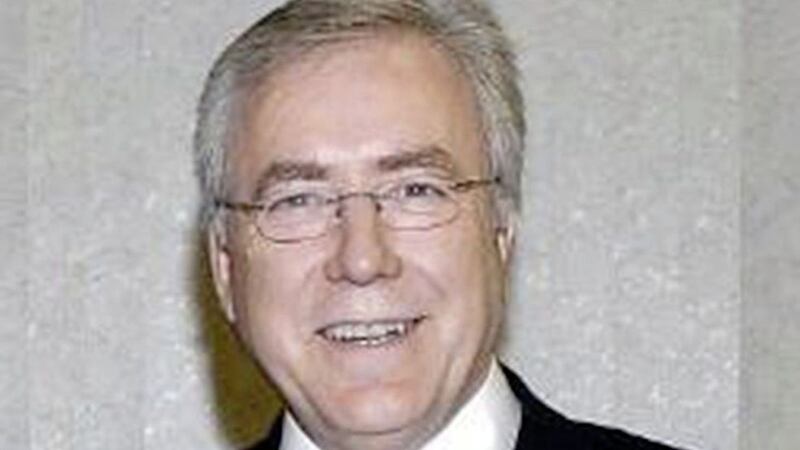A leaked report into a surgeon at the centre of a public inquiry has revealed concerns about his work go back "possibly decades" - with patients left at risk of "dangerously late" cancer diagnoses.
The confidential probe into Aidan O'Brien, a retired consultant urologist based at Craigavon Area Hospital, was sparked by his "persistent" failure to assess or 'triage' GP referral letters, which he said was "too time consuming".
Signed off last May, the explosive Southern health trust review reveals the consultant had "over 700" missing GP letters in his filing cabinet in 2016 - which were discovered to contain 30 'red flag' patients. Four of these patients were subsequently diagnosed with prostate cancer.
In what is also a devastating indictment of oversight and monitoring processes at the trust, investigators found a "haphazard" triage system dating back "approximately 25 years" in which concerns about "difficult colleagues" and "difficult issues" were not passed up the line.
Revelations about a culture in which "seniority, reputation and influence" took precedence over openness and transparency regarding patient safety are contained in the no-holds-barred probe.
Read More
Analysis: Striking similarities across Northern Ireland health service scandals
When contacted by The Irish News on Friday for reaction to the damning findings, Mr O'Brien released a statement through the Medical Protection Society expressing "concern" about the leaking of the document.
"I am concerned to learn that a confidential report concerning patients has been passed to the press. As I will be participating in the forthcoming public inquiry into the urology service provided by the Southern Health & Social Care Trust, I will not comment further at this time, out of respect for patients and for the integrity of the inquiry."
Among those interviewed for the report were the head of urology services who admitted she was aware of issues concerning Mr O'Brien when she got her job - that left his colleagues often 'covering' his triage lists.
Triage is the process whereby a consultant assesses the details of a GP referral letter and either upgrades a patient for further assessment or downgrades them depending on their clinical need.
"She indicated she inherited the (triage) problem upon appointment although she was aware that it was a long running issue going back perhaps 25 years," the report states.
"She highlighted this was an ongoing issue with (Mr O'Brien). He had the longest backlog and took longest to triage. There were issues with other consultants who, on occasion, did not triage but (Mr O'Brien) was the only one, when asked to triage, didn't do it."
The trust report examines the 'root causes' of Serious Adverse Incidents (SAIs) in 2016 in which five patients had their cancer diagnoses and treatment delayed.
It notes that "one particular consultant" had not triaged their GP referral letters.
Senior health service sources have confirmed this consultant - referred to as 'Cons1' throughout - is Mr O'Brien.
The 'missing' patient letters were unearthed by the head of urology services who sought permission to look for them in the surgeon's filing cabinet in 2016. His consultant colleagues did a trawl and found the 30 suspected cancer cases, of which four were diagnosed.
At "a later date" a fifth patient in his early fifties whose referral "could have been in the consultant's filing cabinet" was found to have advanced bladder cancer as well as prostate cancer, with his diagnosis delayed for six months. Investigators found this lapse was "probably clinically significant" and "time would tell" as to the outcome.
Mr O'Brien retired last July after working for 28 years in the trust. He also saw private patients at his home.
When health minister Robin Swann ordered a public inquiry last November due to issues "of the gravest concern", it followed the recall of 1,000 patients who were under his care between January 2019 and June 2020.
But the document reveals failings went back to 2006, warning: "Over a period of decades, within the Southern Health and Social Care Trust and Craigavon Area Hospital, there were occasions when triage was not performed and this varied between consultants and specialities.
"Acute services had a particular problem with this issue. Preliminary discussions by the Review Team revealed that triaging within Acute Services was a very haphazard process going back for approximately 25 years.
"There were many consultants who would not triage but (Mr O'Brien) was the most persistent and there were multiple attempts to tackle the issue."
It concludes: "From examining the triage system over the length of time it existed, it is obvious there is an unwillingness or inability within the medical hierarchy to tackle its 'difficult colleague' problem. The reasons behind this probably include not taking ownership of its own problems and poor support from senior medical management perhaps resulting in issues not being referred upwards."
The report shows Mr O'Brien's "waiting lists problems" were first detected between 1996-1998 when he was the lead doctor in the outpatients department.
It emerged the medic kept his outpatient letters in a "ring binder" which "were not on any waiting list".
"Once challenged, he would stop this practice and improve but then slip back," the review finds.
Alarmingly in 2007, one of Mr O'Brien's waiting lists was "10 years long", the report states.
"They worked on this with the consultant and cleaned it up, they found no serious patients related issues."
Matters "came to a head" in April 2010 following a radical shake up of urology services across Northern Ireland - when the surgeon was "put under pressure to complete his triage list", according to the review.
Clashing with his colleagues, Mr O'Brien said he instead wanted to attend a study leave trip in Spain. However, he was informed by trust management he would not be travelling to Spain unless he cleared the backlog, which he did that evening.
Criticism of a failure to escalate the consultant's "consistent and prolonged non-compliance" to executive level (medical director/chief executive) was made.
The probe raised further concerns about the GP referral process for the 'missed' five cancer patients and concluded all should have been classed as 'red flag' cases.
They also note the consultant urologist had a particular way of organising his work load which led to "higher standards of care/triage" for some patients while others "crucially" were not seen at all.
"The Review Team concluded that (Mr O'Brien's) prioritisation of work and attention to detail led to some patients receiving a high standard of care, while others ran the real risk of having a cancer diagnosis delayed till it was dangerously late".
Significantly, they found the surgeon "would have been in no doubt about his responsibilities" as he was "intimately involved" in developing Northern Ireland clinical guidelines for the triage process of urology cancer patients in 2014.
Defending his work practices, Mr O'Brien told the review team: "Yes I did it my way... I wasn't cognisant of being unbending. I am very particular."
He also stated he took annual leave each Friday "and spends the weekend triaging", arguing he felt unable to perform other main consultant duties of the week including wards rounds, clinics and emergency theatre sessions while doing "non red flag triage".
"I do triage entirely in my own time to allow me to do it properly," he told them, adding that he had previously escalated his concerns about time pressures and work loads to management.
Consultant urologist colleagues with similar workloads were able to triage referral letters "in a timely fashion", the review team found.
They concluded: "The non-triage of of urology referrals by (Mr O'Brien) has been an ongoing problem in the trust for many years, possibly decades.
"While there were pockets of non-compliance by other consultants, when escalated, compliance improved. However, the review team note that (this consultant) consistently did not return triage information on referrals thus not allowing the appropriate prioritisation of appointments by clinical need."
Multiple attempts were made between service directors (past and present) to resolve the issue with Mr O'Brien but conversations often became "heated".
In its final recommendation, the authors state: "The trust must set in place to a robust system within it medical management hierarchy for highlighting and dealing with 'difficult colleagues' and 'difficult issues', ensuring that patients safety problems uncovered anywhere in the organisation can make their way upwards to the Medical Director's and Chief Executive's tables.
"This needs to be open and transparent with patient safety issues taking precedence over seniority, reputation and influence."
Both the Southern Trust and The Department of Health said it would be "inappropriate" to comment on the report ahead of the public inquiry.
A department spokeswoman added that Mr Swann has raised the issue of "whether action could have been taken earlier by the Trust to identify and address the apparent deficiencies in the consultant's clinical practice".


